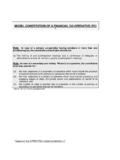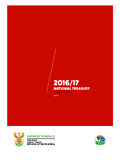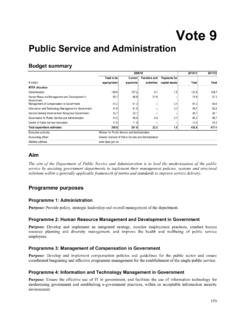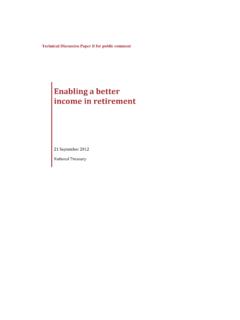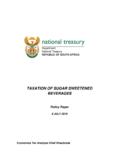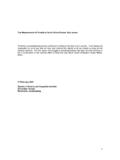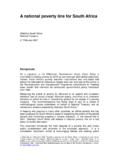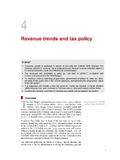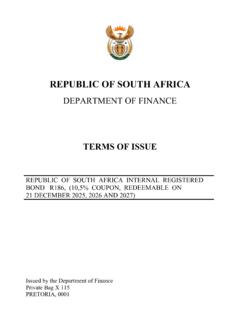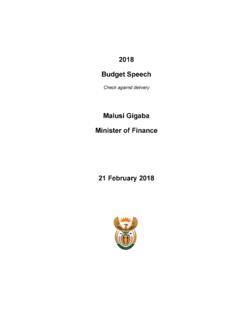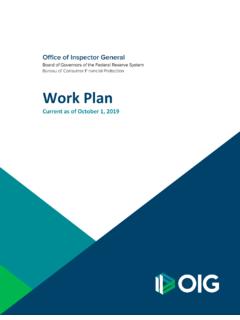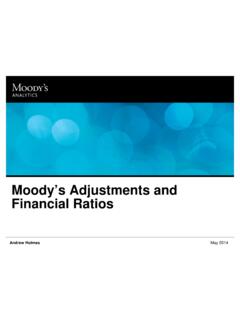Transcription of Financial management and MFMA implementation
1 15711 Financial management and MFMA implementation Introduction Sound Financial management practices are essential to the long-term sustainability of municipalities. They underpin the process of democratic accountability. Weak or opaque Financial management results in the misdirection and under-utilisation of resources and increases the risk of corruption. The key objective of the municipal Finance management Act (2003) (MFMA) is to modernise municipal Financial management . municipal Financial management has four interrelated components: planning and budgeting, revenue and expenditure management , reporting and oversight.
2 Each component contributes to ensuring that expenditure is developmental, effective and efficient and that municipalities are held accountable. The reforms introduced by the MFMA are the cornerstone of the broader reform package for local government outlined in the 1998 White Paper on Local Government. The MFMA, together with the municipal Structures Act (1998), the municipal Systems Act (2000) and the municipal Property Rates Act (2004), sets-out the procedures and processes for municipal operations, planning, governance and accountability.
3 This chapter gives an overview of: the municipal finance reform programme the management of the reform programme in municipalities how the budgeting and planning processes are being strengthened Sound Financial management practices underpin the process of democratic accountability 2008 LOCAL GOVERNMENT BUDGETS AND EXPENDITURE REVIEW 158 the strengthening of oversight through improved transparency and reporting practices the strengthening of the regulatory environment for municipal Financial management institutional strengthening and capacity building. Reforms in municipal Financial management The municipal Financial management reforms aim to support a coherent institutional and procedural approach to Financial management that assists in improving service delivery.
4 The MFMA replaced an antiquated system of local government finance that focussed on compliance with rules and procedures. Practices, such as one-year, line-item budgeting, did not support long-term strategic planning nor match resources with needs over the medium-term. This generally resulted in councils allocating resources based on historical commitments rather than looking at current priorities and the future needs of communities. municipal practices were also not rooted in a culture of performance and regular reporting . Reports were often irregular or inaccurate, or contained too much data and too little useful information.
5 Often municipalities did not publish annual reports and did not submit their Financial statements for audit on time or in some cases at all. The lack of effective monitoring and reporting systems often resulted in councils finding out too late about any Financial problems that had arisen. The MFMA and its regulations seek to address these historical weaknesses in budgeting, accounting , reporting and provide tools for improving efficiency in the use of public funds. The municipal Financial management and accountability cycle The municipal Financial management and accountability cycle consists of: Integrated development plan (IDP): Sets out the municipality s goals and development plans.
6 Council adopts the IDP and undertakes an annual review and assessment of performance. Budget: The IDP informs the budget. The budget sets out the revenue raising and expenditure plan of the municipality for approval by council. It is linked to the service delivery and budget implementation plan (SDBIP). The budget and the SDBIP lay the basis for the performance agreements of the municipal manager and senior management . In-year reports: Council monitors Financial and non- Financial performance through quarterly and mid-year reports produced by the administration and tabled in Council.
7 Annual Financial statements: These are submitted to the Auditor-General who issues an audit report on Financial and non- Financial audits undertaken simultaneously. Annual report: Reports on implementation performance in relation to the budget and the SDBIP. Oversight report: Council adopts an oversight report based on outcomes highlighted in the annual report and actual performance. Audit committee: Provides independent specialist advice on Financial and non- Financial performance and governance. municipal practices were not rooted in a culture of performance and regular reporting CHAPTER 11: Financial management AND MFMA implementation 159 Key mechanisms for strengthening accountability The first mechanism involves separating and clarifying roles and responsibilities of executive councillors, non-executive councillors and officials.
8 This is important for good governance. The municipal manager holds the primary legal accountability for Financial management in terms of the MFMA and, together with other senior managers, is responsible for implementation and outputs. The aim is to allow managers to manage, but to also make them more accountable. The executive mayor and executive committee are expected to provide the municipality with political leadership, by proposing policies, budgets and performance targets for the municipality and oversee their implementation by monitoring performance through monthly progress reports.
9 Non-executive councillors, as elected representatives of the community, debate and approve the proposed policies and budgets and also oversee the performance of the municipality. They hold both the executive mayor or committee and the officials accountable for performance on the basis of quarterly and annual reports. The second mechanism involves developing a performance orientation. The legal framework introduces requirements and processes for establishing service delivery priorities and plans. As noted the SDBIP sets out performance targets and provides a link between the IDP plans and the budget.
10 The third mechanism involves strengthening reporting and disclosure requirements. High quality and timely management information allows management to be proactive, identifying and solving problems as they arise. It also strengthens the separation of roles and supports a performance orientation in local government. Two-phased approach to implementing MFMA reform implementation of the MFMA reforms has been phased in two ways: First, implementation has been phased to accommodate the diverse capacity of municipalities. Municipalities with low capacity were given extra time to comply with certain aspects of the MFMA, while municipalities with high capacity were required to implement the Act more rapidly.
